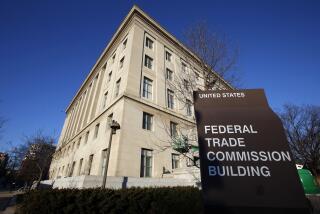Trust Deeds Can Bring Big Returns, but Carry Risks for the Uneducated
- Share via
It’s easy to earn up to 16% a year on your money. That’s what some seminars and real estate brokers are telling people about investing in trust deeds. And while some investors are indeed realizing such bountiful returns, trust deeds are a risky endeavor for the average person. There’s the promise of a nice return, but there’s also the risk of the investment being wiped out by declining property values or a borrower who just doesn’t pay. Trust deeds are basically three-party legal instruments which are created to secure real estate loans. In California, when a property owner (called the trustor) borrows money from a lender (called the beneficiary), he or she does so by signing a promissory note to repay the debt.
The borrower also signs a trust deed --also known as a deed of trust--giving a neutral third party (called the trustee) the power to foreclose and sell the property if the borrower doesn’t make good on his or her loan obligation.
Investors can enjoy handsome returns by essentially becoming lenders and funding trust deeds. Profiting from this type of investment, however, requires general knowledge of trust deeds as well as of the borrower and the property.
“I’ve seen a lot of people making a lot of mistakes when investing in trust deeds,” said Paul D. Johnson, a trust deed broker and investor based in Simi Valley and the author of “The Trust Deed and Mortgage Investor’s Quick Start Consumer Guide.”
TD investors should know all the pitfalls before they invest their money, Johnson said. “Different properties and loans have different risks,” he said, but there are some universal things to keep in mind.
First, many of the TDs sold to investors are hard-money loans made to borrowers who have been turned down for loans by more conventional lenders.
Second, many of the TDs sold to investors are second or third mortgages. If a borrower fails to pay on a second mortgage, the beneficiary can, of course, foreclose. The beneficiary, however, has to be prepared to keep paying any senior mortgages or pay those senior mortgages off in cash.
Third, collecting mortgage payments from the borrower may become a problem if the borrower can’t or won’t pay. Foreclosing on a loan can be both cumbersome and expensive. Get a professional loan servicing agent, Johnson advised.
Investors should neither service the loan themselves nor allow the broker who sold them the investment to do the servicing, he said. “Never let the broker service your loan; there are too many potential conflicts of interest,” Johnson said. Besides, he added: “Some brokers are dangerously incompetent in servicing loans.”
*
“Unfortunately, said Rick Kapko, president of National Home Equity Corp. in Van Nuys, “in our business there are a lot of unscrupulous, unethical and unlicensed individuals.” Kapko’s company has been in business for about 15 years and buys primarily TDs for its own portfolio. The company also services loans and does the documentation for lenders who make a loan to help sell their own home. Kapko’s fees for servicing a loan range from a low of $10 to $15 a month to as much as 1/2 of a percent of the loan balance annually.
Investors are advised by Kapko to find out all they can about the property that is the underlying security for the loan and demand a packet with thorough information about the property and the borrower. Investors should watch out for bloated appraisals and do their own analysis of the collateral underlying a loan.
Most investors get involved with trust deeds through real estate brokers. Not all the people who are selling investors on the idea of TDs have to be licensed brokers, however. While those people who act as a “broker” need to be licensed, individuals can sell up to seven TDs a year without a license. And, many of those who are putting on seminars in hotel ballrooms all over the Valley and Ventura County don’t usually come under the purview of the Department of Real Estate.
When buying a trust deed from a real estate broker, it is best to check out that broker thoroughly. It is possible to research how long the broker has been in business, whether the broker is properly licensed with the California Department of Real Estate, how many loans the broker has sold and whether the broker has any loans in his or her own account. It is also usually advisable to buy through brokers who also invest their own money in TDs.
Finding good deals can be tough. After all, why would a borrower with lots of equity and good credit be willing to accept a loan with an interest rate high enough to provide the TD investor with 14% or more yearly return? The answer is that many borrowers whose loans are being sold to TD investors were either uneducated or hard-up for money.
*
The best TDs are ones with stable borrowers who either need the money on short notice and are willing to pay dearly for it or TDs being sold by former property owners who took back a second, for example, and are now willing to sell the rights to collect that second at a discount, in exchange for cash from the TD investor. These deals need to be carefully researched.
Finally, investors should be wary of most so-called “fractionated” investments. These are pools of TDs that are sold to pools of investors. While there may be some benefit to holding an interest in a diverse group of loans, there’s always the risk that the investors may have to take over responsibility for senior loans. This can get expensive and complicated if the other pooled investors don’t accept their share of responsibility.
More to Read
Inside the business of entertainment
The Wide Shot brings you news, analysis and insights on everything from streaming wars to production — and what it all means for the future.
You may occasionally receive promotional content from the Los Angeles Times.









